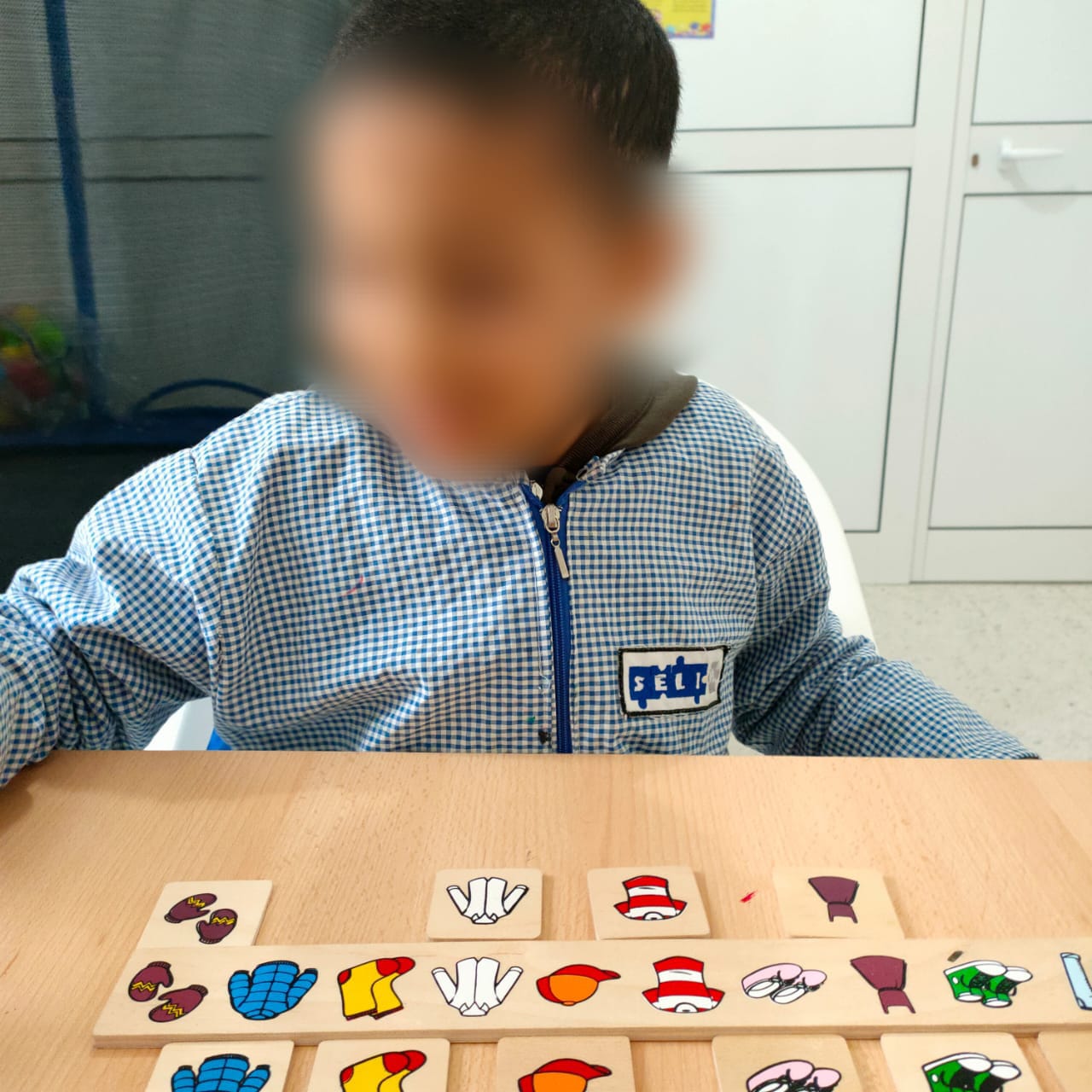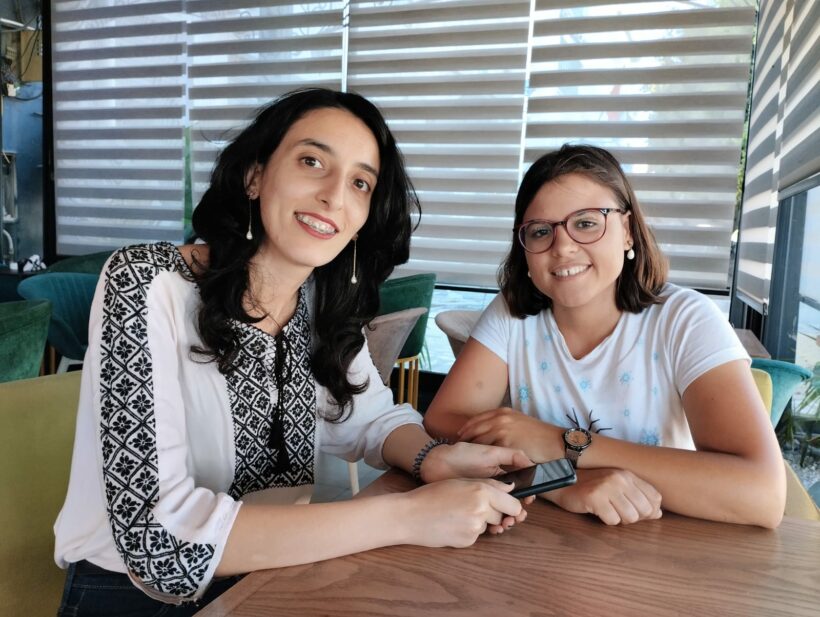Recently, Tunisia signed a declaration stating that families with autistic children aged 3 to 5 years old will get monetary compensation for assisting them with expenses of their children’s school and therapy. Despite the assistance, the monetary of 200 Tunisian Dinars (around 60 USD) does not cover much of the money needed to help these children.
To understand more about Autism, we interviewed Asma Haddeda, a speech therapist in Tunisia, to learn more about this disorder and its situation in Tunisia.
Asma Haddeda recently opened her own office. She has experience working with different organizations and associations that treat autistic children and tackle speech challenges in general.

What is Autism and what are its characteristics? At what age can parents recognise that their children have autism and start addressing it?
Autism is a neuro-developmental disorder that’s officially named as “Autism Spectrum Disorder” (ASD). It has three levels depending the degree of severity; mild, mid-range, and severe. There are 3 prominent signs that help us identify autistic children which are: social interaction, stereotypical repetitive movements, and lack of visual confrontation.
Generally, autism can be identified from a very young age and can be noticeable when children have speaking difficulties, lack of interaction with parents and peers, and, as parents say, “act like they don’t hear us when we call for them”.
Language delay is the most noticeable symptom for the parents and it is their biggest motivator to consult doctors and professionals in order to identify their children’s condition. Of course, there could be other reasons that could cause this language delay that are not necessarily linked to autism. That’s why consulting a medical professional is important before sending children to a speech therapist for example.
What are some of the issues that you noticed in relation to ASD in Tunisia?
Autism in Tunisia, as well as in the world, is still hard to classify since there is a debate on whether it is considered a mental or physical disability. Autistic people in Tunisia are given a disability card even though it is not a mental handicap. Even though in 2020, it was declared that Autism will not be classified as a disability or a handicap anymore, the law concerning this issue hasn’t been approved yet.
People are still afraid of autism due to their lack of knowledge about it. They think that autistic children are incapable of developing and joining the social or professional lives. People believe autism as a mental handicap that will not allow their children to grow smarter, study in public schools or have a normal life, when it is not necessarily the case.
Another issue that I noticed is the fact that parents realise late that their children are autistic. They would visit our association when their children are 5 years old which is considered very late in this case. Sadly, that would render working with these children more challenging since they grew older without having enough care. Fortunately, things started changing in the last few years. Parents became more aware and started noticing autism on their children when they are aged 2 or younger and send them to care centres to get them the necessary attention and care that they need.
Can Autistic children be integrated in public schools in Tunisia or is it mandatory for them to be sent to special centres that deal with Autism?
Actually, autistic children can go to public or private schools or to special centres depending on the severity of their cases.
For children with mild autism, they can be integrated into public schools after undergoing examinations and evaluations that test the extent to which that child would manage to cope with the system. As for private schools, there are no restrictions, conditions, or rules that hinder autistic children from enrolling. If the child is capable of coping with the environment, they can go to private schools.
As for the case of children suffering from a severe case of autism, they might not be able to be integrated in either school. This could be due to the fact that teachers do not know how to deal with autistic children. Children with severe cases of autism could have anxiety crises; they would yell, scream, or leave the classroom. As teachers do not know how to handle these situations, they tend to refuse teaching autistic children under the pretext that they cannot be integrated into schools.
The age condition is another important factor that we need to consider when answering this question. If the child has reached the age of 9 without going to any school, they will face a difficulty to be integrated in public schools. That is due to the fact that autistic children usually have an age delay since they learn almost everything a bit later than other children. In these cases, it would be easier to integrate children in special centres even though they might have good mental abilities.
Nevertheless, public centres for autistic children are not very common. There are some governorates in Tunisia that do not have a single public centre for autistic children or for children with special needs. Most of the available centres are either private and half-private. They are expensive and are not sufficient to contain all the autistic children.
What are some of the challenges that you faced in your work?
In relation to my work, as a speech therapist, I noticed that autistic children require more care and support. We need to be patient, caring, and repeat everything when teaching them. As someone who works closely with autistic children, I want to put emphasis on the importance of being patient and open-minded because I noticed that most of the problems that I encountered are related to the therapists’ lack of patience. Autistic children have a different way of perceiving the world and they create their own comfort space to feel safe. We need to be more aware of that to know about how to help these children and teach them how to be integrated into society.
Dealing with autistic children is difficult due to the factors that I mentioned earlier and due to their lack of communication or speech delay. This is especially difficult when parents bring their children when they are 3 years old or older.
Another challenge that I faced is related to convincing parents that their children might not manage to be integrated into public schools after they spent a lot of money to help their children evolve.
How are autistic children treated in the special centres that deal with ASD?
There are several centres that mistreat autistic children. I say that based on everything that I have witnessed throughout the years starting from when I was a student.
Autism is one of the most challenging pathologies to deal with. It requires a lot of patience and repetitiveness, as I emphasised earlier. I’m repeating this because I noticed that the mistreatment of autistic children is related to the specialists and teachers’ lack of patience. Working with autistic children is an ongoing process that starts from age 2 or earlier until they reach 9 years old.
For children to improve, parents need to work with them when they get home. It is highly recommended that parents repeat the same activities that their children did during their therapy sessions. If they do not do so, paving the way for children to improve and to be better would be more challenging for the teachers and therapists.
With time, therapists and specialists start losing their patience and try to seek a response from the children. Instead of trying to understand them, they end up forcing them into doing things. They also resort to abusing children by hitting them or yelling at them. Nothing can justify this treatment of specialists toward children. What complicates things further is the fact that the centers’ conditions are not good and are not well equipped.
Where do you see the status of autism in Tunisia in the future? Are there any measures that should be taken into consideration and are there any reformations one needs to be aware of?
Concerning the status of autism in Tunisia, as I explained in the beginning, it is still unclear. Nevertheless, there is hope. Recently, a new declaration came up that stated that a certain number of autistic children will get a monetary scholarship to help them with the expenses of their therapy as well as their studies. To be more specific, 300 children will get 200 Tunisian Dinars each month. That amount is expected to be divided into two sections; 100 TND for Kindergarten, and the other 100 TND would be employed to cover the expenses of speech and psychotherapeutic therapy.
It is not much, but it is a good initiative that showcases how there is more awareness about autism in Tunisia. The main factor that contributed to this is that the number of autistic children has grown immensely. It is the “pathology of the century”, if I might call it. There is almost no family that does not have an autistic child in Tunisia.
Even though there is progress, that progress is not enough. The scholarship does not cover much of the expenses and it is addressed to a limited number of children. Autistic children require special care! They are notentally disabled. This is a syndrome, not a disease or a mental illness. So, we need to treat it that way.
Autistic children are not mentally disabled as some people tend to believe. Autism is an innate pathology that needs to be addressed from a very young age to help children integrate into their social and professional lives. Tunisia has just started reconsidering its policies toward ASD and it made attempts to address it. Nevertheless, it is not enough!












